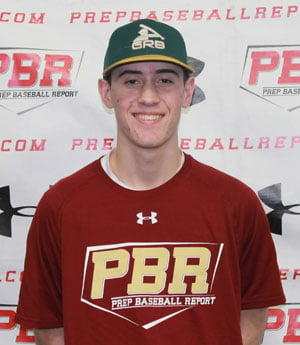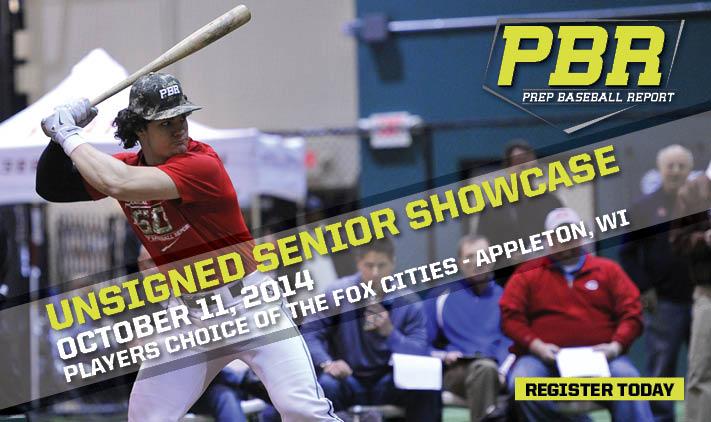Q&A With Texas A&M Commit Dakota Klein
September 22, 2014
By Steve Nielsen
Scouting Supervisor - Wisconsin/Illinois
Last week we featured a Q&A with Harvard commit, Simon Rosenblum-Larson (Madison West), and it was clear to see how his academic success opened several recruiting doors for the right-handed pitcher. This week, and on a similar course, LHP Dakota Klein (Bayport, 2015) talks about his decision to become and Aggie and what it means to him and his family to return to Texas A&M. Klein, is no stranger to the classroom and his academics certainly played a big role in opening several doors and opportunities at the next level.
Here’s a look at our conversation with Klein and his commitment to Texas A&M.
PBR: What advice would you give to young baseball players striving to get where you are?
Klein: On the field, I would say that you need to always approach the game with intensity and trust that you will develop as a result of your effort. In the classroom, take your studies seriously from the beginning. Your life beyond baseball will be much longer than your life in baseball; playing baseball is temporary, but your education will last you for the rest of your life. My work in the classroom afforded me a lot of options in terms of financial aid and the types of schools that were in my range. For a young player, working hard in school will keep a lot of options open. In terms of recruiting, it is important to be proactive. Your current coaches can help you, but it is important that you build and maintain bridges with college coaches. You can't count on being passive when considering college baseball. In this part of the country, college coaches have to go to greater lengths to identify and see players, so it's vital that you reach out.
PBR: What were your expectations about the recruiting process? Was it as expected? Easy/Difficult?
Klein: Starting last summer, I really began looking into the recruiting process. I didn't have much action going on in terms of recruiting, but I started doing my homework on different programs and acquainting myself with the process. Before the spring/summer season with my travel team even began, I was very proactive in establishing lines of communication and getting my name out there to coaches. Though I knew that recruitment would require a great deal of communication and a little bit of politicking, I really didn't understand the nuances of the whole process all that well. It was interesting to see how different programs operated their recruiting and the ways that they presented themselves. These factors, along with personally meeting or communicating with the coaches, allowed me to cut through the fog of recruitment and get a better understanding of the personality of each staff. Some programs are more engaging than others, and it really does have an effect in their ability to recruit. In terms of difficulty, I would say that talking on the phone with coaches and staying in touch was not hard, but the process of weighing the costs and benefits of every school was extremely difficult. I agonized over this decision, and I definitely took my time doing research.
PBR: What were you looking for out of a college program to continue your baseball career at?
Klein: First and foremost, I wanted to find a school that I loved. I wanted a place that I enjoyed, even without baseball in the equation. In terms of the baseball, I wanted a program that could help me develop to my fullest potential as soon as possible. This idea encompasses good coaching, excellent facilities, and expansive resources available to the student-athlete -- all of which A&M has. Additionally, I am considering an engineering degree, which is very time intensive. I wanted to make sure that the coaching staff would be willing to allow me to pursue this degree. Coach Childress was supportive of my goals and expressed a willingness to work with the schedule that I would have to accept as an engineering student.
PBR: When did the recruiting process really start to heat up for you? Was there a particular game or event that you feel turned the corner for you?
Klein: The recruiting process started heating up for me in the spring, and it escalated all the way into August. Several events contributed to my recruitment significantly.
PBR: What do you like most about Texas A&M and what were the key factors in making your decision?
Klein: I was first drawn to Texas A&M because of my family connection to the school. My parents both went there and are diehard Aggies, so I've been raised in the spirit of A&M since day one. When I was a kid living in Texas, and even in the years that I've lived in Wisconsin, I always thought about playing in the maroon and white. It always felt like such a distant, improbable goal, so the opportunity to return to Texas and play for A&M has been a dream come true. Aside from my past connection, Texas A&M is a school that is unparalleled when it comes to tradition and the spirit of the student body. It's an environment that is known for being welcoming, and all the Aggies I know have an immense pride for their school. Academically, I was encouraged by strong programs in the sciences and engineering. In addition, my AP credit and other testing should allow me to walk in the door at A&M as a junior. This may require picking a major earlier, but I imagine that it'll alleviate some of the stress in my course load. In terms of baseball, there was a lot to like. An enormous upgrade in 2012 has made Blue Bell Park one of the premier venues in college baseball, and the recent work on Kyle Field has created great ancillary benefits to student-athletes of all kinds. Playing in a conference as tough as the SEC was also a big draw. Moreover, I got along very well with Coach Childress, and I like the program that he runs. With these resources in mind, I felt that A&M would be a place to develop my baseball skills as quickly and effectively as possible.
PBR: Did location or distance from home play a factor in your decision?
Klein: Distance was not really a consideration in my decision. Whether it was Boston or College Station, I knew that I would be able to make the best of whatever situation I'd jump into. It is nice being in Texas, however, because nearly all of my extended family lives in Texas. I'll be able to see them more often than I did in Wisconsin.
PBR: Where did Texas A&M first see you? How did your relationship develop with them?
Klein: I first communicated with Texas A&M a year ago. I went to their prospect camp last July but then did not speak with the coach for a while after that. This past summer, I reconnected with Coach Childress and went to their August prospect camp for my last event of the summer. I performed well at that event, and the rest is history.
PBR: What other schools were on your short list before you made your final decision?
Klein: When my season ended in mid-August, I was essentially looking at choosing between eight schools: Texas A&M, Baylor, St. Louis, Indiana, Notre Dame, Yale, Princeton, and Harvard. By the last week of August, I had narrowed the decision down to Harvard and A&M. They are very two very different schools, and thus very difficult to compare, so the decision was tough. It was hard to turn down Harvard, but I'm very happy with what I decided and the way I went about it.
PBR: What is your best attribute as a baseball player and how does that transfer onto the field for your team?
Klein: I think my best attribute in baseball is my ability to stay on a pretty level emotional plane. I always try to keep the game in perspective, so I never get too high or too low. Whether we are winning or losing, I treat the game with the same effort and attitude.
PBR: What is the most memorable moment in your baseball career to this point?
Klein: Stepping on the mound at Fox Cities Stadium this past spring was pretty special. I always watched Bay Port at state as a kid, and I was able to be a part of the team in my freshman and sophomore years, but to actually get out there and take the reigns was awesome.
PBR: Preview your high school season for us. How do you feel your team will be? What are your expectations and goals?
Klein: I am very optimistic for this upcoming season. There will not be a great deal of turnover with most of our starters returning. We'll have a stronger pitching staff with more depth than last year. Like every year at Bay Port, the ultimate goal is state.
More Wisconsin News
- PBRPlus The Rode Report9.22.14
- PBRPlus Wisconsin's All-Unsigned Senior Team9.18.14
- PBRPlus The Hotlist: Other 2017 Prospects To Keep An Eye On9.17.14
- WI Unsigned Senior Spotlight: MIF Zach Bailey9.17.14
- PBRPlus Recruiting Essentials: NCAA Division I Scholarships9.15.14
- WI Q&A with Harvard commit Simon Rosenblum-Larson9.15.14


